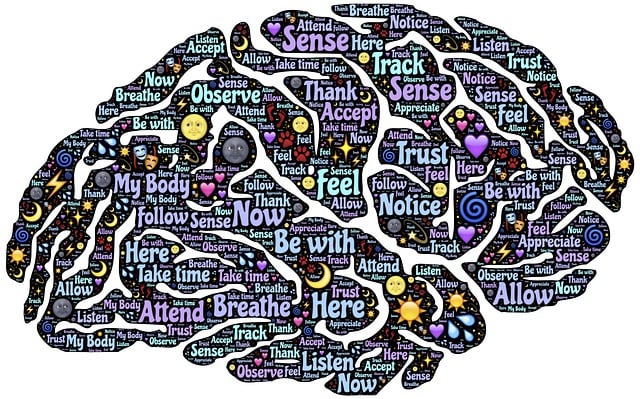Aurora Interpersonal Issues Therapy (AIIT) prioritizes risk assessment as a cornerstone of its interpersonal approach. Therapists meticulously evaluate clients' interpersonal relationships and social environments to identify potential risks linked to mental health issues like depression. This process informs personalized interventions, including self-awareness exercises, aimed at preventing harm and promoting emotional healing. AIIT's comprehensive risk assessment predicts negative outcomes by encouraging individuals to explore their thoughts and behaviors within social contexts, fostering resilience. Through structured planning, clients learn to manage stress, recognize early signs of depression, and adopt healthy coping mechanisms, empowering them to take charge of their mental well-being. Continuous improvement is driven by tracking client progress using standardized tools, qualitative feedback, and data-driven adjustments, ensuring AIIT remains responsive to clients' evolving needs.
Risk assessment and harm minimization planning are essential components of effective Aurora Interpersonal Issues Therapy. This article explores key aspects, beginning with understanding risk assessment within this therapeutic framework. We delve into identifying specific harm minimization strategies and their practical implementation in Aurora sessions. Additionally, we discuss measuring success and fostering continuous improvement to ensure optimal client outcomes. By integrating these principles, therapists can enhance safety and support clients navigating interpersonal challenges.
- Understanding Risk Assessment in Interpersonal Therapy
- Identifying Harm Minimization Strategies
- Practical Implementation in Aurora Therapy Sessions
- Measuring Success and Continuous Improvement
Understanding Risk Assessment in Interpersonal Therapy

In Interpersonal Therapy (IPT), risk assessment is a cornerstone of effective treatment planning. It involves identifying and evaluating potential risks or hazards that may impact an individual’s mental health, particularly in relation to their interpersonal relationships and social environments. By understanding these risks, therapists like those at Aurora Interpersonal Issues Therapy can tailor interventions aimed at harm minimization. This proactive approach ensures that clients receive support tailored to their unique challenges, whether dealing with depression prevention, managing complex emotional healing processes, or enhancing self-awareness exercises.
Through comprehensive risk assessment, IPT aims to predict and mitigate negative outcomes, focusing on both the present and future. It encourages individuals to explore their thoughts, feelings, and behaviors within their social contexts, identifying potential triggers for distress. By fostering self-awareness, clients gain valuable insights into their emotional responses and interpersonal dynamics. This process empowers them to make informed decisions, develop coping strategies, and strengthen resilience in navigating interpersonal challenges.
Identifying Harm Minimization Strategies

Identifying Harm Minimization Strategies involves a comprehensive approach tailored to individual needs and challenges. The process begins with thorough assessment of interpersonal issues, which often play a significant role in mental health struggles. Through Aurora Interpersonal Issues Therapy, professionals can help individuals recognize and address damaging patterns within relationships, fostering healthier connections and enhancing overall Mental Wellness Podcast Series Production.
This therapeutic journey not only enables Coping Skills Development but also strengthens psychological resilience. By focusing on boosting confidence and self-esteem, harm minimization strategies empower individuals to navigate challenging situations more effectively. Ultimately, these strategies aim to reduce the impact of interpersonal issues, promoting a more positive and balanced lifestyle.
Practical Implementation in Aurora Therapy Sessions

In the context of Aurora Interpersonal Issues Therapy (AIIT), risk assessment and harm minimization planning are integral components for a practical and effective therapeutic approach. Before initiating sessions, therapists must conduct thorough evaluations to identify potential risks and vulnerabilities among clients, especially those struggling with depression prevention or seeking stress management strategies. This involves understanding the client’s history, current circumstances, and any relevant interpersonal issues that may escalate during therapy. By predicting these risks, therapists can proactively develop mitigation strategies.
The implementation process entails tailoring therapeutic techniques to address specific needs while ensuring a safe space for emotional expression. For instance, enhancing Emotional Intelligence (EI) through AIIT can empower clients to navigate interpersonal challenges constructively, thereby reducing the risk of severe distress or self-harm. Through structured planning, therapists guide clients in managing stress, recognizing early warning signs of depression, and adopting healthy coping mechanisms. This proactive approach not only minimizes potential harm but also fosters resilience and empowers individuals to take charge of their mental well-being.
Measuring Success and Continuous Improvement

Measuring success and implementing continuous improvement are vital components of any effective risk assessment and harm minimization strategy, particularly in the context of Aurora Interpersonal Issues Therapy. Therapists can assess progress by tracking specific client outcomes related to coping skills development and mood management using standardized tools and qualitative feedback mechanisms.
By adopting Mind Over Matter Principles, therapists can foster a culture of continuous learning and adaptation. Regularly reviewing case notes, conducting client satisfaction surveys, and encouraging open communication allow for the identification of areas where services can be enhanced. This data-driven approach ensures that therapy remains responsive to clients’ evolving needs, ultimately improving overall therapeutic outcomes.
Aurora Interpersonal Issues Therapy (AIIT) effectively incorporates risk assessment and harm minimization planning, as outlined in this article. By understanding risk factors, identifying appropriate strategies, and implementing them practically, AIIT sessions can significantly enhance client safety and well-being. Measuring success through continuous improvement ensures that the therapy remains dynamic and responsive to individual needs. This holistic approach not only addresses interpersonal issues but also fosters a supportive environment, ultimately promoting positive outcomes for all clients engaging in AIIT.














